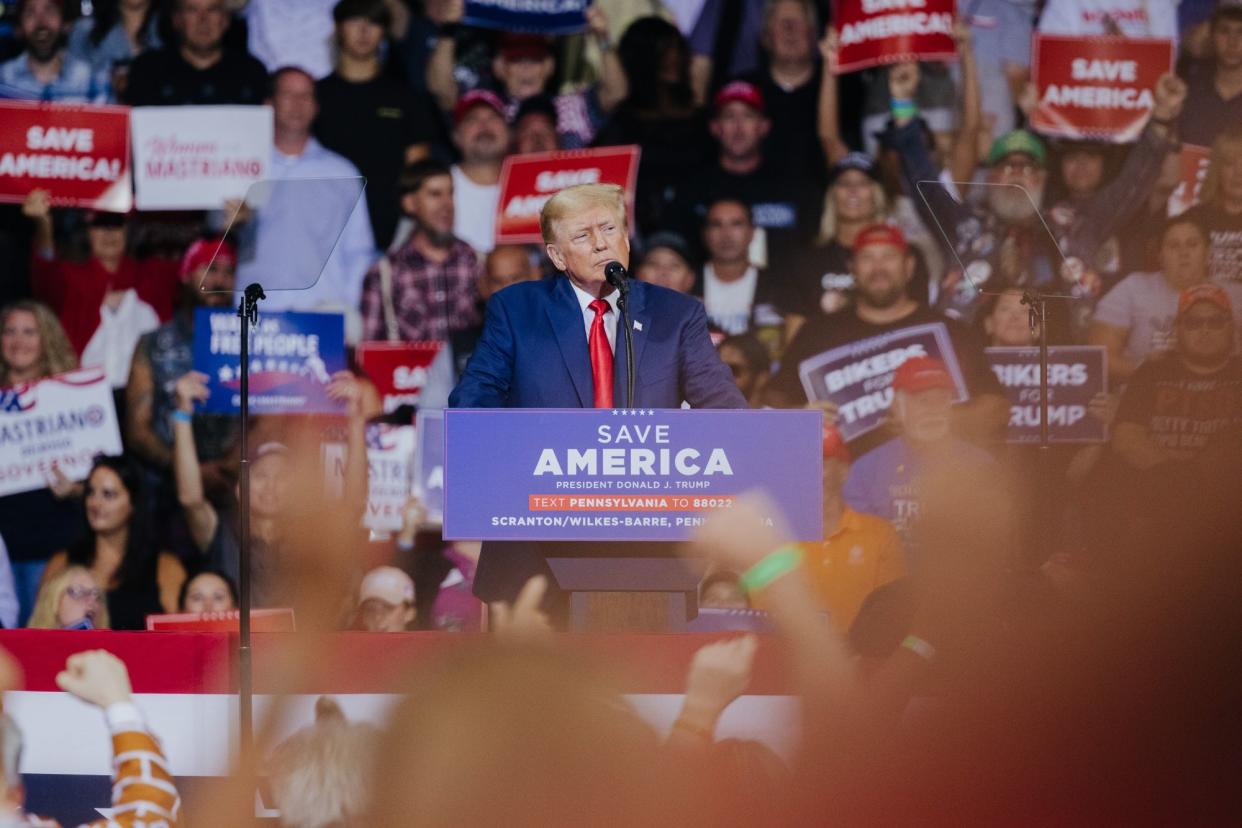Trump Candidate for Special Master Review Gets DOJ Approval

- Oops!Something went wrong.Please try again later.
- Oops!Something went wrong.Please try again later.
(Bloomberg) -- Former President Donald Trump and the US Department of Justice agree that Judge Raymond J. Dearie would be a suitable choice for an outside special master to review more than 11,000 documents taken from Trump’s Mar-a-Lago home last month as part of an investigation into his handling of government records.
Most Read from Bloomberg
Ugly Selloff Pushes Stocks Down Most Since 2020: Markets Wrap
Xi Returns to World Stage With Putin to Counter US Dominance
The World’s Hottest Housing Markets Are Facing a Painful Reset
In a filing Monday evening that marked a rare moment of consensus in the case, the Justice Department said Dearie, along with its two other candidates, retired Judge Barbara S. Jones and retired Judge Thomas B. Griffith would be acceptable.
The government said “because previous federal judicial experience and engagement in relevant areas of law are important qualifications for this position,” one of the three judges should be selected.
US District Court Judge Aileen Cannon will have the final word on who should fill the post, but her choice could be made easier with both sides agreeing on one of the candidates.
In a filing earlier in the day Trump’s lawyers notified the judge that they objected to DOJ’s names, but declined to explain why, saying that they thought it was “more respectful” to not share that information on the public record. The attorneys wrote that if the judge wanted more details, they could provide them in private, which would be unusual in a court proceeding that has largely played out in public.
Dearie is a senior federal judge in the Eastern District of New York, which covers Brooklyn and Long Island. He served a rotation on the Foreign Intelligence Surveillance Court, an arm of the federal judiciary that mostly operates in secret because of the sensitive nature of the covert operations and national security interests at stake.
Dearie was one of several judges to sign off on a succession of warrants that the FBI sought to surveil Carter Page, an adviser to Trump’s 2016 campaign, as part of a broader investigation into Russian interference in the election. The Justice Department inspector general later concluded that federal investigators had made mistakes and omissions in its warrant applications to the Foreign Intelligence Surveillance Court, fueling long-running criticism of the Russia probe by Trump and other Republicans.
Some legal pundits who panned Trump’s push for a special master and criticism of the investigation met the proposal of Dearie with praise. Andrew Weissmann, who spent much of his career as a federal prosecutor in the Eastern District of New York and later served as a senior member of special counsel Robert Mueller’s team, wrote on Twitter that Dearie was a “model judge” and predicted the choice would backfire on Trump.
Although Trump’s lawyers had described Dearie as “retired,” DOJ noted that the judge is still an active senior judge on the court; it wasn’t immediately clear if that would create any practical complications for him to be appointed special master in the Florida case. Federal judges face limits on accepting outside employment and compensation, but there are fewer restrictions for senior judges. An official with the Eastern District of New York told Bloomberg that Dearie planned to fully step aside and go “inactive” at the end of 2022.
“If this court were to select Judge Dearie as the special master, the government would defer to the court and Judge Dearie to determine whether the special master role would constitute outside employment and what rules and/or restrictions, if any, would apply to his serving in this capacity,” the government’s lawyers said.
The Justice Department opposed Trump’s other choice, Paul Huck Jr., a lawyer in Florida with ties to Republican party politics, arguing he lacked the same level of experience as the other three candidates.
Jones served as a special master in cases involving former Trump lawyers Michael Cohen and Rudy Giuliani, which Trump had cited in his initial push for a special master. Griffith had served on the federal appeals court in Washington.
Along with choosing a special master, Cannon will also have to settle several disagreements between Trump and DOJ when it comes to the scope and practicalities of the special master’s work.
The chief points of contention are whether the special master should review more than 100 documents that the government says have classified markings, and whether the judge should continue to block federal investigators from using those records in the interim. The Justice Department has asked the judge to carve out documents with classified markings; Trump’s lawyers notified the judge earlier on Monday that they continued to disagree with that proposal.
Trump and the Justice Department also disagree about other aspects of the special master process. Trump wants a three-month timeline while DOJ wants the review done by Oct. 17. Trump wants to split the cost of paying the special master, but DOJ says the former president should foot the whole bill since he wanted the review. Trump wants documents to go directly to the special master, whereas DOJ wants to see a log of Trump’s categorizations first, to see if there are any areas of agreement.
Most Read from Bloomberg Businessweek
It’s White-Collar Jobs That Are at Risk in the Next Recession
The Ethereum Merge Ups the Stakes—and Reshapes the Crypto Universe
Chinese Manufacturers Get Around US Tariffs With Some Help From Mexico
Google’s Loon Project Gets Resurrected. Without Google. Or Balloons
©2022 Bloomberg L.P.


